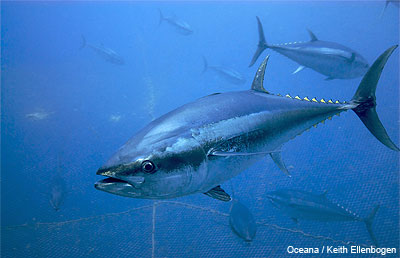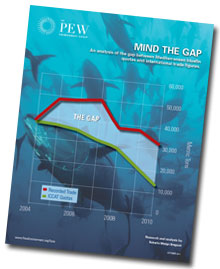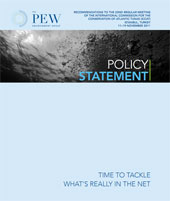Overfishing 101: ICCAT: Time to Tackle What's Really in the Net
What's in a name? If you're talking about ICCAT—the International Commission for the Conservation of Atlantic Tunas—so much is contained in that one acronym. This body manages all the tuna and tuna-like species found in the vast ocean waters between the United States and Europe and between South America and Africa. It's not just a faceless acronym, either. ICCAT comprises 48 governments, including the United States, Canada, Brazil, the European Union, Japan, Turkey, and North African countries. Any country that regularly fishes for ICCAT-managed species in the Atlantic Ocean or the Mediterranean Sea is a member.

So why are we talking about ICCAT now? Well, its 22nd annual meeting takes place this month in Istanbul. If you appreciate tuna (or sharks and swordfish) and the important role they play as apex predators in the oceans, then you need to know about this meeting.
Understanding ICCAT
 ICCAT is a regional fisheries management organization (RFMO), an intergovernmental body that manages highly migratory species. Human boundaries do not apply as tuna and other animals migrate through the waters of many countries and the high seas. RFMOs were established to coordinate the fishing and conservation measures of these countries. Unfortunately, most RFMOs (there are 17 in all, including five that are considered tuna RFMOs, such as ICCAT) have a spotty record when it comes to conservation.
ICCAT is a regional fisheries management organization (RFMO), an intergovernmental body that manages highly migratory species. Human boundaries do not apply as tuna and other animals migrate through the waters of many countries and the high seas. RFMOs were established to coordinate the fishing and conservation measures of these countries. Unfortunately, most RFMOs (there are 17 in all, including five that are considered tuna RFMOs, such as ICCAT) have a spotty record when it comes to conservation.
Given that these bodies make most decisions by consensus, it's not terribly surprising that ICCAT has had difficulty developing strong measures that sustainably manage these species. In other words, everyone has to agree, or nothing gets done. Think about how hard it is for your group of friends to decide on a movie to watch or a place to eat. Now think of 48 governments, each one trying to balance fishing industry, environmental, and government interests when setting catch limits for fish worth billions of dollars on the open market.
ICCAT's history has been more checkered than that of most RFMOs, or at least more publicly so. In 2008, an independent review famously called ICCAT's Atlantic bluefin tuna policies a “travesty of fisheries management.” That same year, ICCAT's own scientists said its bluefin catch limits “were not respected and largely ineffective in controlling overall catch.” Pew's recent report on the illegal and unreported trade in Mediterranean bluefin tuna shows that these problems continue. And they involve more than bluefin: Some shark species have been ignored, even though their numbers have plummeted by up to 99 percent. (Read more about Pew's shark campaign here.)
Fixing the problems
After years of advocacy efforts by environmental groups, ICCAT and its member governments have recently taken steps to address some of the glaring conservation oversights of recent years. Bluefin tuna quotas have been tightened, and compliance measures have been improved. But more needs to be done.
This year, ICCAT's member countries can take the next step. Pew's “Mind the Gap” report shows that significant weaknesses in the management of Mediterranean bluefin tuna allow huge amounts of unreported fish to be caught and then sold on the global market. This has to stop, because the quantity of this catch is endangering this species.
 For example, in 2010, the trade in Mediterranean bluefin tuna exceeded the legal catch limit by 141 percent. If these fishing levels continue, scientists estimate that the population, already near historic lows, has a less than 24 percent chance of rebuilding by 2022.
For example, in 2010, the trade in Mediterranean bluefin tuna exceeded the legal catch limit by 141 percent. If these fishing levels continue, scientists estimate that the population, already near historic lows, has a less than 24 percent chance of rebuilding by 2022.
ICCAT must adopt an electronic-catch documentation system, because the current paper-based system is full of holes and allows unreported and illegally caught fish to enter the market. An electronic system would close these loopholes by adding real-time monitoring, increasing the ease of enforcement, and providing a more accurate count of the amount of bluefin tuna caught each year.
For years, ICCAT ignored illegal and harmful fishing practices. Pew is urging ICCAT to build on last year's progress and tackle “what's really in the net” at its meeting in Istanbul. Taking steps to reduce the fraud in the Mediterranean bluefin fishery will go a long way toward accomplishing this goal.






